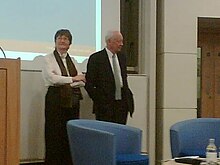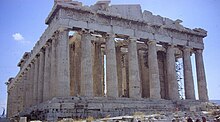Charles cell phone
Charles B. Handy (born July 25, 1932 in Clane , Ireland ) is an Irish economic and social philosopher and author.
biography
Handy received his undergraduate degree from Oriel College , Oxford ; graduated in 1956 Summa cum laude in Greats (Literae Humaniores, a degree with classical content, history and philosophy). After college , Handy worked for twelve years as a manager for the British oil company Royal Dutch Shell in South-East Asia and London . In Kuala Lumpur he met his future wife Elizabeth († 2018), who worked there as a teacher. Even under her influence, he refused a transfer to Liberia and instead took up his studies at the MIT Sloan School of Management again in 1965 , where he met Warren Bennis , Chris Argyris , Ed Schein and Mason Haire and developed an interest in how companies work developed.
On his return to England in 1967, Handy was a co-founder of the London Business School (LBS), which has the only Sloan program outside the United States. Handy became the first dean of the LBS's Sloan program, where leaders were typically trained between the ages of their mid to late 30s. His unusual methods left a lasting impression that could be felt years after Handy left the LBS. In 1972 he took over a full professorship for management psychology at the LBS and continued teaching there. Here the questions of the change in society and the world of work and the necessary reaction to them became the focus of his work.
From 1977 to 1981 Handy worked at a conference and training center for ethics and values at Windsor Castle (the private residence of the Queen of England ).
From 1987 to 1989 he was chairman of the Royal Society of Arts in London. He holds honorary doctorates from seven UK universities. In the UK, it is because of his BBC radio program "Thoughts for Today" ( Thoughts for Today known) to a wider audience. Handy is considered one of the most influential management thinkers.
Handy has two grown children and lives alternately in England and Italy.
Key points of cell phones work
Handy is primarily concerned with the changes that work and organizations are subject to in modern society and economy. In this context, in his book Gods of Management, he describes four organizational forms and their cultures , which he represents through four classical Greek gods. The organizations are briefly described in the following table.
| Club culture | Role culture | Task culture | Existential culture | |
|---|---|---|---|---|
| God | Zeus | Apollo | Athena | Dionysus |
| image | network | |||
|
Principle of order |
central person | written rules, fixed roles | mutual agreement, changing roles | negotiation |
|
Recipe for success |
Act like the boss! | Stick to the rules! | Keep adapting yourself again and again! | Make compromises! |
| environment | Young companies | Stable, predictable environment, repetitive tasks | unstable environment, changing tasks | - |
| Problems | - | Changes | repetitive tasks, routine | Reaching consensus |
| corresponds to | Mintzberg’s simple structure |
Mintzberg’s machine bureaucracy Tom Burns’s mechanistic organization |
Mintzberg's Adhocracy Tom Burns' Organic Organization |
- |
The first three cultures (club, role, task culture) are quite conventional. After Handy there is no industrial existential organization, but the industrial trend towards outsourcing will in his opinion produce more organizations of this type. Traditionally, Zeus and Athene cultures might have developed in the direction of Apollo cultures. But the change in the world with more unstable environmental conditions and an increasingly educated and mobile workforce, who at the same time want to adapt less and less to the rigid structures of the organization, forces changes and adjustments that call the continued existence of these organizations into question.
Handy also sees a paradigm shift in the industry. In a similarly dramatic upheaval as the subsistence economy was replaced by the industrial revolution in the 19th century , Handy believes that the industrially revolutionized economy will be replaced by the knowledge economy .
This requires a restructuring of the company. Handy uses the Irish national emblem , the shamrock (three-leaf clover). The Shamrock organization is based on three essential elements:
The first is called mobile professional core (Engl. Professional core ), consisting of skilled workers, technicians and management. This is where Handy sees the differentiating knowledge and skills of the company concentrated. These employees are highly rewarded for which extraordinary performance, flexibility and commitment are required of them. This group is managed in a task culture (Athene).
The second group consists of special and special services that can be obtained more cheaply on the market (see transaction cost theory ), i.e. organizations of specialists who work for the company (or others) through contractual ties but no longer full-time. Handy here refers not only to components and materials, but also to services, e.g. B. Company canteen, machine cleaning, maintenance and repair, etc. This practice also makes new knowledge more important, e.g. B. Just in time delivery systems and similar developments. This group of people is paid according to the task at hand, not based on time wages.
Handy sees flexible workers as a third group , a (large) group of people who do not have a permanent job, but are only recruited by the company when needed and for the duration of the need. Nevertheless, this group must not be viewed by the management as irrelevant because it is easily replaceable, since otherwise the costs are reflected in the form of quality defects etc. This group is led in a role culture (Apollo), where the leadership must be fair enough to achieve the required productivity.
With the emergence of shamrock organizations, there is another discontinuity in the power structures of organizations. Instead of focusing as before power at the center of an organization, phone looks the appearance of federal organizations (Engl. Federal organization ) operating systems. In federal organizations, knowledge and skills are concentrated in the Shamrock -organized sub-organizations. This is also where decisions are made about strategy, investment, etc. For the sub-organizations, the drive for cooperation is the potential gain in economies of scale or similar advantages. The company headquarters only takes on supporting functions for the sub-organizations, e.g. B. Large investments, development investments or appointment of top talent. The main task of the center is the formation and maintenance of the vision.
Handy describes the federal organization in an analogy with universities, where the central administration has neither the knowledge nor the possibility to lead the departments directly. Two criteria must be met for this.
- Subsidiarity , functions that can be decided more efficiently at lower levels are also decided there. This requires the central management to have considerable trust in the federal elements. Subsidiarity can only be proven if the central management gives up control functions and gives the elements enough time to develop the required knowledge and skills.
- The urge to expand , the urge on the part of the federal elements to broaden and expand their remit. Handy uses the image of the inverted Doghnut (American lard with a hole in the middle). In the inverted Doghnut , the hole in the middle is filled and then there is a toroidal gap to the outside. With this gap, the job is given a leeway in which the job owner and his tasks can expand.
While traditional companies were organized in Apollo cultures with narrow task and job descriptions, this form of organization in mobile phones, federal organizations is changing more and more to Athene cultures with correspondingly flexible task and work positions.
Works (selection)
- Understanding Organizations London 1976 Penguin
- The Future of Work , Oxford 1984 Basil Blackwell
- Gods of Management: The Changing Work of Organizations , London 1986 Business Books
- The Making of Managers , London 1988 Longman
- The Age of Unreason , London 1989 Business Books
- The empty Raincoat , London 1994 Hutchinson
- The Hungry Spirit , London 1997 Hutchinson
- Twenty-One ideas for Managers: Practical Wisdom for Managing Your Company and Yourself London 2000 Jossey-Bass
- Me and other trivialities , Düsseldorf, 2007
swell
- ↑ Parts of the biography taken from the BBC : “Charles Handy - biography” on September 20, 2006
- ↑ a b c d e f g h i j k Lawrence M. Fisher, The Paradox of Charles Handy ; strategy + business, autumn 2003, No. 32.
- ^ Derek S. Pugh and David J. Hickson Writers on Organizations , 5th ed. (1996), Penguin Books ISBN 0-14-025023-9
Web links
- Literature by and about Charles Handy in the catalog of the German National Library
- "We will all become self-employed portfolio workers" ; Interview with Charles Handy on December 14, 2017
| personal data | |
|---|---|
| SURNAME | Cell phone, Charles |
| ALTERNATIVE NAMES | Handy, Charles B. |
| BRIEF DESCRIPTION | Irish economic and social philosopher |
| DATE OF BIRTH | July 25, 1932 |
| PLACE OF BIRTH | Clane , Ireland |



